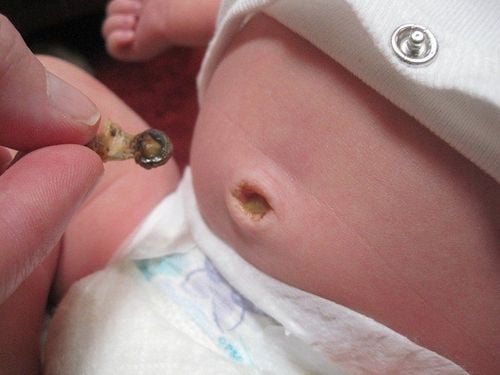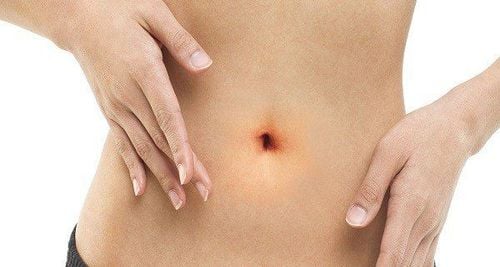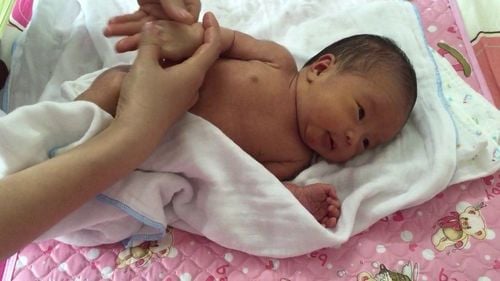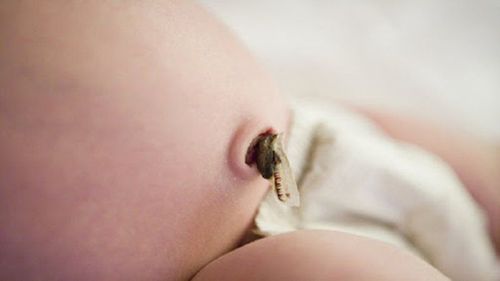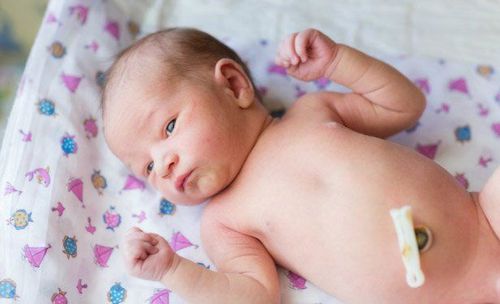The umbilical cord provides oxygen and nutrients for the fetus to develop while in the mother's womb. After birth, the umbilical cord is clamped and cut, leaving an umbilical stump that eventually falls off and heals to form the navel. Normally, the umbilical stump may have a characteristic odor before it falls off. However, if a newborn's navel smells bad after it has fallen off, this may be a problem and the baby needs proper care.
1. Umbilical Cord Odor in Newborns
Newborns are covered in amniotic fluid and birth canal secretions, which may cause an unpleasant odor at birth. This odor usually disappears after bathing, except around the umbilical area
After birth, the umbilical cord connecting the baby to the mother is cut. A remaining portion of the umbilical cord, which changes from pink to blue, may remain until it falls off completely. Initially, the remaining portion of the umbilical stump may have an unpleasant odor, but this odor will gradually disappear after the remaining portion falls off completely.
Previously, pediatricians recommended cleaning the umbilical cord stump with alcohol. However, alcohol can dry out and irritate the newborn's delicate skin. This can lead to skin peeling and secondary infection, so the use of alcohol for cleaning is no longer recommended. Thus, the remaining umbilical cord should be allowed to dry and fall off naturally.
In rare cases, the remaining umbilical cord stump may become infected and may be manifested by redness, swelling, itching on and around the umbilical area, with or without yellow or green pus. If infected, the newborn's navel will emit a foul odor, and the baby will likely react to pain when touched.
In addition, the baby may also have a high fever due to infection and become very fussy, refusing to feed and even sleeping excessively. In this case, the baby will need appropriate wound care of the navel and may even need systemic antibiotics if the infection is severe.
Since about 10-20% of newborns have an umbilical hernia at birth, due to the abdominal muscles not being able to close completely after birth, a portion of the intestine or abdominal contents may protrude through the opening and become infected. This results in a foul-smelling navel in the baby. In this case, an umbilical hernia can be easily diagnosed by seeing a small, soft swelling around the navel, and this condition usually decreases when the child is three to four years old.
Conversely, if the baby is still eating and sleeping well and is not fussy, there is nothing to worry about. Parents should leave the remaining umbilical cord as it is, and the condition of the smelly navel will gradually subside and disappear naturally after a few days. However, do not try to forcibly remove the remaining umbilical cord. This will cause pain to the baby and may also cause infection and scarring of the abdominal wall.
2. How to Clean a Newborn's Umbilical Cord
After your baby is born, a midwife or obstetrician will clamp and then cut the umbilical cord. After cutting, a small section of the umbilical cord will remain attached to your baby's navel - this part will be about 2-3 cm long and is called the umbilical stump.
Over the next 7 to 14 days, the umbilical stump will darken, dry out, shrink and eventually fall off. The small remaining wound will heal and become the navel on your baby's abdomen. Here are some easy care tips for your baby's umbilical stump before it falls off.
Steps to clean your baby's navel:
Wash your hands with soap and water before touching your baby's umbilical cord and before and after changing your baby's diaper.
Clean the base of your baby's umbilical cord with plain water when you bathe your baby. You do not need to use any soap, cream or antiseptic ointment to keep this area clean.
Make sure to dry the umbilical cord properly after bathing your baby. Gently pat the remaining cord dry with a clean towel or soft cloth. Fold the diaper down so that the remaining cord is not covered and leave it to air dry for a while if the weather is not too cold.
If the base of the cord is soiled with your baby's stool or urine, clean it with plain water or soap if necessary. Pat dry and leave to air dry for a while.
Never try to pull off the umbilical cord as it will fall off on its own.
3. What to do after the umbilical cord falls off?
The umbilical cord stump can be discarded. Continue to wash your hands before touching your baby's navel area. The navel may appear slightly black or have red spots. It may also smell and have some clear, sticky or slightly brown fluid that leaves a stain on your baby's diaper or clothing. This is part of the healing process of the umbilical cord and may take up to seven days to heal completely. This process does not hurt your baby.
Continue to keep your baby's navel clean and dry by washing with plain water when bathing and patting dry. Continue to fold your baby's diaper down and leave it to air dry for a while.
If the navel has a small amount of discharge, you can dampen a cotton ball with warm water to gently wipe it clean, making sure not to bleed. Use a new cotton ball each time you wipe the area and then discard it.
4. When to see a doctor for a smelly baby navel
Has a fever or elevated body temperature.
Has redness or a red streak around the navel that feels warm and soft.
Has cloudy discharge that does not clear up after cleaning the navel and surrounding area.
Seems unusually sleepy, lethargic, does not want to feed as usual or seems unwell.
In summary, a smelly navel in a newborn is common in the first few days of life. However, if the smell is strong and accompanied by other signs such as redness around the navel, fussiness, or poor feeding, this may cause problems. It may indicate an infection, parents should take them to the doctor promptly, even if the umbilical cord has already fallen off in order to control the infection effectively as soon as possible.
In conclusion, parents should be vigilant in caring for their newborn's navel. If there is yellow discharge after the cord falls off, the baby should be examined by a doctor immediately if there are any unusual symptoms.
Newborns are generally susceptible to umbilical and respiratory problems. To protect your baby's health, it is recommended to exclusively breastfeed for the first 6 months (if possible) and vaccinate your baby on schedule. If you notice any symptoms such as poor appetite, fatigue, or fussiness, take your baby to the hospital for consultation and treatment.
Please dial HOTLINE for more information or register for an appointment HERE. Download MyVinmec app to make appointments faster and to manage your bookings easily.




